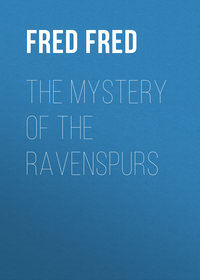 полная версия
полная версияThe Slave of Silence
"You cannot answer me," he went on. "You find it impossible to do so. You are running great risks for a worthless creature who is as crooked in mind as he is in body."
"Oh, don't," Mary Sartoris said. "Don't say such terrible things, please; they hurt me."
"My dear girl, I am sorry, but it is best to state these things plainly. You may not know everything, but you can guess a great deal. Otherwise, why did you try and see Sir Charles Darryll the night before his death, why did you write him the note that was found in his bedroom? And again, why did you stay in the hotel that night and try to warn the servants on night duty? You see, Mary, it is quite useless to try to keep the secret from me."
Mary Sartoris looked at the speaker with dilated eyes. For a moment she could not speak. And yet there were no signs of guilty terror on her face.
"I did not imagine that you knew so much," she said.
"I know more, but I would far rather know a great deal more," Berrington admitted. "Mind you, matters are out of my hands and the police are hot on the track. Why do you not confess everything and save yourself, Mary? For instance, you stand a chance of being placed in the dock on a charge of being concerned in the disappearance of Sir Charles Darryll's body."
"I am as innocent of that as the grave, Phil. I only did my best to try to prevent – "
"Oh, I know, I know," Berrington said impatiently. "But the fact remains that the body of Sir Charles Darryll was stolen for some vile purpose, and that the culprits are in grave danger. Your brother is at the bottom of this affair; he it was who drove up to the Royal Palace Hotel in that black hansom that took the body away. And yet you say that that man – "
"Is more sinned against than sinning," Mary Sartoris cried. "I say it still. Of course you regard me as blind and foolish, but then you do not know everything."
"It is not a matter of what I know," Berrington protested. "Of course I should believe every word that you tell me. But the police will take another view of the matter altogether. Do you know what is going on behind that closed door yonder?"
The girl shuddered and hid her face in her hands. She seemed afraid to say anything. Berrington asked the question twice before he could get any reply.
"Indeed I don't," she said. "I am not altogether in my brother's confidence. I ventured to say something to him to-day and he was dreadfully angry. He locked me in my bedroom, but I managed to get the door of the dressing-room open and escaped that way. I was going to interfere when I saw you. There seem to be other people there."
"Oh, there are," Berrington said bitterly. "There are two adventurers, called Reggie and Cora, who very recently passed at the Royal Palace Hotel for General Gastang and Countess de la Moray. There is the scoundrel Stephen Richford who tricked Beatrice Darryll into marrying him, and then there is also a ruffian called Dr. James Bentwood. What was that?"
"It seemed to me like a cry of pain," Mary Sartoris said in a frozen whisper.
It was very like a cry of pain indeed, a fluttering, feeble cry ending in a moaning protest. Acting on the impulse of the moment, and forgetting Inspector Field altogether, Berrington crossed the hall and laid his hand on the knob of the door. Mary Sartoris darted after him, her face white with fear, and terror and anxiety in her accent.
"Don't do it," she said, "pray restrain yourself. There are mysteries here, strange, horrible mysteries that come from the East, of which you know nothing, despite the years you have passed in India. Oh, the danger that lies there!"
In spite of his courage, Berrington hesitated. He might have recovered his self-possession and returned to the drawing-room, only the strange feeble cry of pain was raised again. It was more than flesh and blood could stand, and in a sudden passion Berrington opened the door. He would have entered resolutely, but Mary pulled him back.
"The mischief has been done," she said hurriedly. "If anyone has to suffer let it be me. I have brought you to this pass and I must get you out as best I can. Carl, what is this?"
The girl thrust herself past Berrington who stood in the shade of the doorway. There was a sudden snarling, with a cry from the girl, as a blow tingled on her cheek. Somebody laughed as if approving this cowardly business.
With a cry of rage Berrington darted into the room. Instantly a pair of strong hands were laid on him and he was borne backwards. Just for a moment he lashed out freely and successfully and then the weight of numbers was too much for him. The dining-room door was closed again.
CHAPTER XVIII
Inspector Field swore a good round oath under his breath. He had not looked for an insane folly like this from a well-trained officer who might have been expected to keep his feelings in check. But, as Field sadly reflected, it was useless to anticipate anything rational when a woman came into the case.
Everything had been going beautifully and smoothly a few minutes ago, and now the plot was ruined. Field was anything but a timid man, he had been in too many tight places in his life to know the meaning of the word timidity, but then he had to exercise a certain discretion.
At the same time he was not blind to the fact that his military ally was in considerable danger. The only thing now would be to bluff the whole thing through, to pretend that the game was up and that the house was surrounded with police.
With this intention in his mind, Field crossed the hall and tried the dining-room door. He was not altogether surprised to find the door locked. He listened at the keyhole, but he could not hear anything whatever. Furthermore, the application of an eye to the keyhole disclosed the fact that the room was in darkness. Despite his courage a thrill ran down the spine of the inspector. There was some more than usually devilish work going on here.
"Well, it can't be helped," Field muttered. "It's the fortune of war. One of us has come to grief, and if I stay here I may share the same fate, and I the only one left who knows anything of the secrets of the prison house. I'll run over and get assistance and we'll search the house. After all, my friend the Colonel has only himself to blame."
Without waiting for anything further, Field slipped out by the way he had come. Once in the road, he glanced back at the house, but the whole place seemed to be in pitchy darkness. There was nothing for it now but to make his way to the nearest police station, and get all the assistance possible. There was no trouble at the station across the Common, the mere mention of Field's name being sufficient. A few minutes later half a dozen constables in silent shoes were on their way to the scene of action. There was to be no fuss and bother; they decided to enter quietly and unostentatiously by the larder window, which was done without any noise whatever.
Once the exits were guarded, there was no necessity for further concealment. But though the lights were turned up all over the house and the most careful search made, not a sign of human life could be seen. Everybody had vanished, as if the whole thing had been a dream. Field, standing in the hall and biting his nails, was fain to admit that he was beaten.
How on earth had those people managed to efface themselves in that amazing manner? They had all apparently vanished off the face of the earth. And there was that bulky package too, that Field believed contained the body of Sir Charles. It was long past midnight before Field left the house, having taken precautions not to disturb anything, but even those precautions might have been in vain. For all he knew to the contrary, the place might be watched by its late occupants who were laughing in their sleeves.
"No use staying here any longer, Macklin," he said disgustedly. "I shall have to go back on my tracks once more. Never do I take an amateur into my business plans again. But it looks as if he has paid for his indiscretion. Good night."
It was late into the following afternoon before Field saw Beatrice Darryll again. When he did so, he had nothing to report save failure. Beatrice listened with the greatest interest to what had taken place the night before, but her interest gave place to grave anxiety when she heard what had been the result of Colonel Berrington's daring action.
"Do you suppose that he is in real danger?" Beatrice asked.
"Well, I'm afraid he is," Field admitted. "You see we are dealing with the most daring and clever and unscrupulous gang of scoundrels that I ever encountered. They would not stick at murder or anything else if anybody crossed them. Mind you, it was a most foolish thing for the Colonel to do. Still, he is a soldier and a very resourceful man and he may pull through. Again these people may not have designs on his life; it is just possible that they might keep him a prisoner until their plans had been successfully carried out. Of course when the Colonel was talking to the grey lady to-night I was not supposed to listen. But I have very good ears, and they spoke loudly at times. I gathered that the scoundrel Sartoris was once engaged to a young lady who threw him over. Now it occurred to me that the young lady might give me an idea or two, provided that she is in England at the present moment."
"Why should you think that she is not here?" Beatrice asked.
"Because the engagement took place at Simla. This young lady was staying with her brother and his wife; unfortunately I did not catch the name. The curious part of the affair is that she is a ward of your late father."
Beatrice looked puzzled for a moment. She did not quite understand.
"You mean that my father was guardian under a will or something of that kind?" she asked.
"That's it, miss," Field exclaimed. "We ought to be able to identify the young lady between us, especially as the affair only took place three years ago or so, as I understand. If you will pardon me for saying so, Sir Charles was a very careless gentleman, and hardly the man that a careful parent would choose as a guardian. The young lady's father must have known yours very intimately indeed, or very little, it does not matter which. Still, I don't suppose that Sir Charles had many of these affairs on hand. Now, see if you can recollect anything of the kind happening during the last three or four years, Miss Darryll."
Beatrice thought the matter over carefully for a moment. Her face lighted up presently.
"I fancy that I have it," she said. "Lord Edward Decié, who was a great friend of my father, died about three years ago. The two men did a lot of speculating together, and indeed Lord Edward passed for a shrewd and successful man. When he died I know my father was executor under the will and that he had some control over the Hon. Violet Decié. I never saw the girl, because she went to India with a married brother, and, for all I know she is there still. I understood that she was rather an impulsive kind of girl who did wild things on the spur of the moment. But you can easily inquire."
Field's face expressed a guarded satisfaction. So far he was not very much out.
"That is the young lady, miss," he cried. "I'll put the inquiries on foot at once. And I don't think that I need detain you any longer."
"One minute," Beatrice said. "What about Colonel Berrington? What steps have you taken to find him? Are you going to have that house at Wandsworth watched?"
Field intimated that he was, though in his opinion it was time wasted.
"They will expect something of the kind, you see," he said. "Of course it is a help to me that my presence in the house was not suspected. They may conclude that Berrington was alone in the business, and on the other hand they may not conclude anything of the kind. But, all the same, I am going to have the house carefully watched."
Before the day was out the disappearance of Sir Charles's body was obscured by the strange absence of Colonel Berrington. Field would have kept this latter fact concealed as far as possible, but then Berrington's landlady had been his old nurse, and she was not rational in the matter at all. The authorities had promised to do all they could, though the press accused them of being exceedingly lax in the business. As a matter of fact, Field had given his chiefs an inkling of the situation, so that they were really doing their best all the time. A carefully planned watch on the Wandsworth Common house had come to nothing, but the people there had not yet returned; indeed very little could have been done if they had.
And Field was turning in another direction. He had to trace the young lady who at one time had been engaged to Carl Sartoris, and he had found it a more difficult business than he had anticipated. It was a delicate business, too, calling for tactful manipulation. A somewhat talkative aunt of the young lady was found at length. She took Field for a lawyer who was seeking the Honorable Violet for her own advantage.
"Oh, yes. She has been back from India a long time," Lady Parkstone said. "Violet is a very strange and clever girl. Yes, she has been engaged more than once. But the engagements are always broken off. Violet was always in love with herself. But very clever, as I said before. At one time she bade fair to become quite a famous artist, and she has had stories in the magazines. Her last fad was the stage and that has lasted quite a long time. In fact she is on the stage now."
"In London, my lady?" Field asked. "She is not acting under her own name, of course?"
"No," Lady Parkstone explained. "She is Miss Adela Vane; at present she is playing at the Comedy Opera House. It is just possible that you know the name."
Field knew the name very well. He departed presently well satisfied with the progress that he had made. It was getting quite late by the time he had found out where Miss Vane lodged, but he had time to go back to Scotland Yard again. There, a note from the superintendent of the Wandsworth Police was awaiting him, asking him to go down as soon as possible. The note was vague but it suggested possibilities.
The Wandsworth authorities had not much to say, but they had one detail. Last night one of the men who was told to watch No. 100 had seen something. The windows were all shuttered from top to bottom, each shutter having a little ventilator in it. Field nodded, for he had noticed this himself.
"Very well, then," the superintendent went on. "So far as we know the house is empty. But is it? If so why should a light have been seen last night, behind the little round ventilator? The light came and went, and in a great flashing, dazzling kind of way for half an hour, and then stopped. It was as if a child was playing with the switch of the electric light."
Field nodded and smiled. He looked exceedingly pleased with himself.
"Guess I understand," he said. "Especially as we are seeking for a military gentleman. We'll go as far as Audley Place at once, and investigate. Only we shall have to call at the Post Office and borrow a clerk out of the telegraph department. Come along."
Field volunteered no explanation, and his puzzled colleague followed him out of the office. The telegraph operator and the others stood opposite the house in Audley Place till the patience of all was pretty well exhausted. Then suddenly the light began to flicker in the upper part of the house.
"Isn't that a message of some kind?" Field asked of the telegraph clerk.
"Right," the other said promptly. "That's a kind of telegraph dash and dot system. Whistle a bar from 'when we are married.' Thank you, sir. That's what the gentleman who is sending out those flash signals is asking somebody to do who happens to understand. That last lot of flashes means 'Thank the Lord!' Now he's getting to business. He wants to know who we are before he goes on."
"Can't you give it back again in any way?" Field asked. "Say it's me."
Very loudly the telegraphic operator tapped the pavement with his stick. It sounded quite meaningless, but the light in the house flared up and down in a triumphant kind of way. The flickering began once more and then stopped.
"It's Colonel Berrington," the clerk said presently. "He says you are not to bother about him in the least, as he is quite safe, and so long as he is in there the men are not likely to do anything rash. And here comes the gist of the message. You are to go to Edward Street in the Borough and keep an eye on one of the houses there, – the Colonel doesn't know which. And you are to go at once, he says."
CHAPTER XIX
Something had been accomplished, at any rate. It was good to know that Berrington was safe and as satisfied with his surroundings as it was possible to be under the circumstances. Though he was a prisoner, he seemed to have been able to obtain important information which he had managed to convey to the outside world without alarming his captors.
"It's not so bad altogether," Field said. "Though I am by no means pleased with the gallant Colonel, who has only himself to blame for the position in which he finds himself. You can all go back to the station, and I shall not want the telegraph gentleman, whose services have been so valuable. Of course, you will say nothing of what you have seen, sir."
The little telegraph clerk gave the desired assurance and went his way. But Field did not turn his steps in the direction of London all at once. For a long time he stood looking thoughtfully at the house in Audley Place. He was just about to turn away finally when the light began to flash and flicker again. It went on a little time and finally ceased.
"Now, has he forgotten something?" Field asked himself. "I wonder if it is possible – "
Field crept quietly towards the house, across the lawn, and made his way to the back by which he had entered the place on a previous occasion. As he expected, the glass removed by him had not been replaced, so that he was free to enter if he pleased. It was a very risky proceeding under the circumstances, but Field decided to try it. He would be much better satisfied to gain speech with Berrington, though the latter's escape might have alarmed the criminals and sent them to cover again.
Field was inside the house again before he had made up his mind what to do. The place was very quiet, and it was evident that the servants had not returned. Perhaps there was nobody there besides Berrington, who was a prisoner in one of the upper rooms. That being the case it was by no means impossible to gain speech with him. Very carefully Field crept along the passages, listening with all his ears.
He had not gone far before he heard a sound as of somebody moving. That somebody was coming in his direction was certain. Field began to blame himself for his folly. If he fell into a trap now, everything would be ruined. He turned down a side passage, without the remotest idea where he was going, and came at length to a lighted room, at the end of which was a conservatory full of flowers. The conservatory was open to the room, so that the whole place was a veritable bower of blooms. On one side was a large bank of azaleas, behind which Field proceeded to hide himself. He had hardly done this when there was a kind of creaking sound, the door was pushed open, and Carl Sartoris entered in his chair. With great difficulty the cripple proceeded to crawl into a big arm-chair, after which he took from his pocket a wig and a pair of spectacles. He seemed to be expecting somebody. He gave a little cough, and immediately somebody in the hall began to talk.
"Mr. Sartoris is in the conservatory room, miss," a voice said, and Field had no difficulty in recognising the voice of the doctor, Bentwood. "Will you come this way, please?"
Field congratulated himself upon the line that he had taken. From behind the bank of flowers he could see pretty well himself, without being discovered. A pretty girl, with wonderfully beautiful fair hair and dark vivacious eyes, came into the room. She was not in the least timid; there was an air of eager expectation about her.
"This is very good of you," she said. "I understand that you sent for me. If you are not in a proper state of health to talk to me I can call again, Mr. Sartoris."
Just for the moment Sartoris made no reply. It seemed to Field that he was not altogether free from physical pain. He shaded his spectacled eyes with a trembling hand, as if the light proved a little too strong for him.
"It is not in the least inconvenient," he said. "I sent for you at this somewhat late hour because I may have to leave England to-morrow. If I do so it will be for some considerable time."
In his mind, Field differed. He had other views for the speaker. He was puzzled, too, at all these quick changes, and because there were so many threads in the plot.
"I can give you an hour," the girl said. "I must be in London by ten o'clock."
"Very well, I dare say we can manage it by that time. As I told you in my letter, I am a very old friend of your father. We were in one or two ventures together, and some of them turned out to be very successful indeed. Did he ever mention my name?"
"I cannot call it to mind," the girl said. "And yet it is not a common name."
"It is not in the least common," Sartoris smiled. "Perhaps your father did not speak of me because we were not quite friends towards the last. At one time I was to be your guardian if anything happened to your father. But we need not go into that, because it is not material to the case at all." The girl nodded brightly, and her eyes expressed admiration of the beauty of the surroundings.
"I believe my guardian was Sir Charles Darryll," she said.
"So I understand," Sartoris proceeded in the same grave way. "It was a most extraordinary selection for a man with a keen business head like your father."
"But you are greatly mistaken," the girl exclaimed. "My father was a perfect child in business matters. Even I was capable of advising him for his good. I should say that there never lived a man who was so easily befooled as my father."
"Is that so?" Sartoris blurted out. "I'm – I mean, of course, yes, as to mere money, but he was clever enough in some ways. Still, the fact remains that he made Sir Charles Darryll your guardian. Did you ever trouble him at all?"
"I never so much as saw him, at least in a business sense."
"Ah," Sartoris cried. There was a deep ring in his voice. "Is that really a fact? You don't know then that certain papers and documents belonging to your father passed to Sir Charles? Your father told you nothing of this?"
"Not a word, except in a joking way. He spoke of securities and mortgages and the like that were to be my fortune when he died. He told me to ask Sir Charles about them."
"Did you take the trouble to do so?"
The girl thought a moment before she replied.
"Once," she said. "Once I did say something to Sir Charles. He told me that every paper in his possession had been deposited with his lawyers."
Once more Sartoris shaded his eyes with his hand. Field could see his fingers shaking. In a hard voice Sartoris asked if the girl meant the family solicitor.
"No, I don't," she said without the slightest hesitation. "As a matter of fact the family solicitor would have nothing to do with Sir Charles – he found him too expensive. It was some little man in one of the Inns, Gray's Inn or Clement's Inn, who kept his creditors at bay. But more than that I am afraid I cannot tell you."
Sartoris muttered something that might have been the strangling of an oath. Field began to understand. Papers, and probably valuable papers, belonging to Sir Charles were necessary; and the gang of thieves was at a loss what to do without them.
"I dare say I can find out," Sartoris said. "If I do, I fancy you will benefit considerably. More than that I dare not venture for the present, my dear young lady, because so frequently these things turn out very differently. If you could think of the name of that solicitor – "
"Perhaps I might," the girl said. "I have a good memory, especially for trifles. If I do recollect the name I will write you here. Do you know you remind me of a man I knew in India. He was much younger than you, of course, and different in many ways. And yet every time I look at you and hear your voice I think of him."
"As a matter of fact I never was in India at all," Sartoris said hastily. There was a nasty ring in his voice that caused the girl to look up, whereon Sartoris laughed, seeing that he had made a mistake. "Excuse me, but this neuralgia of mine is very troublesome to-night. And I am afraid that I am detaining you."






